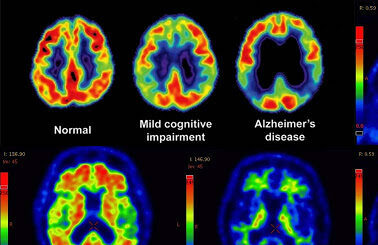Alzheimer’s, anger and aggressive behavior often go hand in hand. Here's a look at the science behind these behavioral symptoms, along with some treatment options for caregivers.
About 90 percent of people with Alzheimer’s disease show behavioral symptoms like agitation, irritability, and anger during the course of the disease. If a caregiver notices a loved one or someone they care for becoming uncharacteristically angry or aggressive, or experiencing another such personality change, it may be a symptom they’ve developed due to either the neurological changes or physical discomfort that comes with living with Alzheimer’s dementia.
Whatever the reason is for their behavior change, understanding and professional guidance from the person’s doctor can get needed treatment may improve their symptoms and quality of life — while helping address the challenges caregivers may be experiencing too.
Are anger, agitation and aggressive behavior common in Alzheimer’s?
Anger is a common symptom in people living with Alzheimer’s. Studies have found that 76 percent of people, when initially diagnosed with Alzheimer’s, develop behavioral symptoms like agitation.
What causes anger in Alzheimer’s?
Alzheimer’s causes changes in parts of the brain including the hippocampus, temporal lobes, amygdala, and limbic system. Many of these brain regions are tied to emotion processing and regulation function. As Alzheimer’s progresses and neurons in these parts of the brain begin to die, brain changes can lead to symptoms like anger, aggressive behavior, irritation, apathy, depression and anxiety.
It isn’t just internal biological changes that bring about these symptoms — anger, aggression, and agitation in Alzheimer’s are linked to environmental factors, too. If you are providing care or support to a loved one living with Alzheimer’s and you’re seeing these symptoms materialize or escalate, be mindful of the following factors:
- Poor sleep
- Pain
- Stress
- Depression
- Constipation
- Changes in routine or environment
- Loneliness and social isolation
- Effects of medication interaction
- Feelings of loss
- Poor communication with caregivers
At what stage of Alzheimer’s does anger occur?
Anger is one of the personality changes that occur at the early stages of Alzheimer’s. It may start even before memory loss symptoms start showing, Dr. Bruce Miller, a behavioral neurologist at the University of California, San Francisco told Being Patient.
One small study observed that about 60 percent of mild cognitive impairment cases, which may progress to Alzheimer’s disease, show agitation. This symptom may worsen as the disease progresses.
Are there safe treatments for anger and aggression in Alzheimer’s?
There are safe treatments for anger and aggression in Alzheimer’s. Treatment options may include non-prescription interventions as well as prescription medications. A doctor may determine which treatment is most appropriate case by case, depending on factors like:
- The individual’s symptoms
- The disease stage
- The person’s living conditions
- Treatment goals
- The person’s personality and life history
A doctor may start treating behavioral symptoms with non-drug interventions. The caregiver and doctor work together to create a treatment plan that may include:
- Acupuncture therapy
- An exercise program
- Music therapy
- Cognitive training exercises
- Repetitive transcranial magnetic stimulation
- A nutrition plan
- Aromatherapy
Research has shown that a number of things that may help mitigate agitation and aggression for people living with Alzheimer’s, from regular exercise, to personalized music to pets.
Cases have also been made that non-drug treatments for aggression and agitation may be more effective than the existing pharmaceutical options.
However, if the above recommendations don’t improve symptoms, and the benefits of taking prescription medications outweigh the risks, a healthcare provider may then suggest prescription medications.
Are there prescription medications to treat Alzheimer’s anger and aggression?
While there are FDA-approved treatments for some Alzheimer’s cognitive symptoms, like memory loss, behavior symptoms in Alzheimer’s is still a nascent space. The FDA has not yet approved any medication for managing Alzheimer’s behavioral symptoms, so prescriptions used in this case may be considered “off label.”
Some experts say this off-label usage isn’t good enough. In a paper published in International Psychogeriatrics in 2020, scientists determined that often, people with dementia living in aged-care facilities experiencing these symptoms are using antipsychotics, “for too long, for off-label indications and without documented consent.” Antipsychotics may also come with an increased risk of mortality in older people living with dementia.
75% of Older Adults With Dementia May Be On the Wrong Prescriptions
Research is progressing however, with the study of new drugs, as well as repurposed drugs, that could be appropriate for Alzheimer’s anger and aggression. For example, anti-depressants and antipsychotics are currently under study. A potentially repurpose-able ADHD drug is currently in trials for Alzheimer’s apathy. And a schizophrenia and major depressive disorder drug, brexpiprazole, is moving through Phase 3 trials now for Alzheimer’s agitation.
First-Ever Drug for Alzheimer’s Agitation, Brexpiprazole, Nears Finish Line
Dr. Dylan Wint, director of clinical operations at the Cleveland Clinic Lou Ruvo Center for Brain Health told Being Patient that a doctor may inquire about the person’s living conditions to determine the risks and benefits of recommending medications.
The doctor may ask about:
- Their behavioral symptoms and whether they affect the care the person get
- The person’s eating habits
- The person’s sleep health or sleeping pattern
- Any other lifestyle changes that they may be experiencing as a result of their behavioral symptoms
- How much the person’s behavioral symptoms may be affecting their quality of life or their caregiver’s.
Medications a doctor may recommend for anger symptoms in Alzheimer’s disease include:
- Second-generation antipsychotic medications
- Benzodiazepines
- Antidepressants
- Mood-stabilizing medications
How can caregivers and care partners help manage anger in people with Alzheimer’s?
Pat Brown, Admiral Nurse for Dementia UK, told Being Patient that when people with dementia show aggression, it’s often because they’re having difficulty communicating their distress to their caregiver. She advises that a care provider “remember that the person is trying to express what they want or need with their behavior” and “explore what may have triggered the distressed behavior.”
She also recommends that to meet their needs in times when they seem aggressive, “acknowledge the person’s distress and ask them what’s wrong to get a sense of what they’re experiencing.” Then you can try to calm, reassure, or redirect them. She calls this the “validation” approach, which can help the person feel listened to and validated.
Here are some recommendations from the National Institute on Aging on providing care or support for a person with Alzheimer’s and for managing anger or aggressive behavior.
- Listen to and understand their concerns, speak to them calmly, and reassure them.
- Give them space and help them to feel a sense of control over their own lives.
- Try to stick to a daily routine — and ensure it includes some quiet downtime.
- Keep pictures and objects they cherish around them to help them feel more secure.
- Help them participate in soothing activities, like listening to music, taking walks, and reading.
- Limit how much caffeine they take.
- Offer them fun objects or activities to help distract them.







My wife has dementia and tend to hallucinate and seem to create situations and try to get me to answer questions about far pass. Example, her parents death of over 40 years. How do one reply?